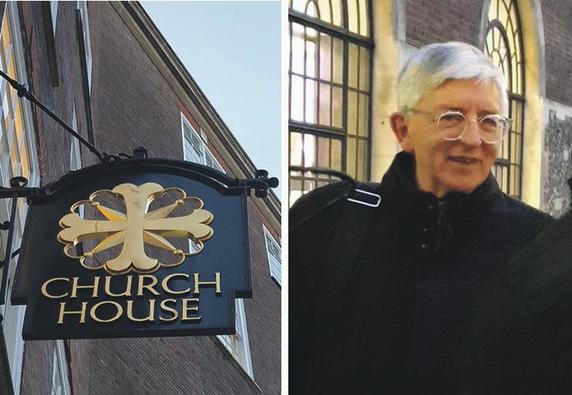Sizer Tribunal: ‘Anti-Semitic behaviour,’ ‘conduct unbecoming’ & ‘implausible and untrue’ account
After years of controversy, Stephen Sizer has been found to have engaged in anti-Semitic behaviour by sharing a ‘deeply abhorrent’ online article about 9-11, knowing it would be offensive to the Jewish community.
Nicola Laver

And in a damning indictment of Sizer’s credibility, a bishop’s disciplinary Tribunal cast doubt on his honesty – rejecting parts of his evidence as ‘implausible and untrue’. It also ruled that Sizer had engaged in a ‘regrettable pattern of behaviour’ that fell short of the standard expected of an ordained minister.
The 69-year-old retired evangelical vicar faced discipline under the Clergy Disciplinary Measure (CDM) 2003 after a complaint by the Board of Deputies of British Jews. It followed several incidents between 2005 and 2018 in which Sizer, well known for his opposition to Christian Zionism, shared online articles and associated with or shared platforms with anti-Jewish and pro-Palestinian figures.
Crucially, the factual evidence was not in dispute; but in his defence Sizer said it was defamatory to accuse him of being an anti-Semite. He said: ‘I have done nothing more than express legitimate political opinions, based on reasoned argument.’
Sizer has repeatedly asserted, in his books and articles, that he condemns anti-Semitism. In his book Zion’s Christian Soldiers, he wrote: ‘Anti-Semitism must be repudiated unequivocally. However, we must not confuse apples and oranges. Anti-Zionism is not the same thing as anti-Semitism despite attempts to broaden the definition.’
Nevertheless, although the Tribunal concluded that Sizer was not ‘anti-Semitic by nature’ – it found that he had at times ‘pushed the boundaries beyond what was acceptable conduct’.
More seriously, it ruled that the most serious allegation of the 11 allegations in total had ‘crossed the line’ into anti-Semitism. His conduct on several occasions was also found to be ‘inappropriate or unbecoming of a clerk in Holy Orders in that he provoked and offended the Jewish community’.
Anti-Semitic
In January 2015, Sizer posted a link on Facebook to an article entitled 9-11/Israel did it, accompanied by his own post which read: ‘Is this anti-Semitic? If so, no doubt I’ll be asked to remove it. It raises so many questions.’
The Tribunal described the article’s tone and content ‘truly shocking’ and ‘virulently anti-Semitic’ – and rejected Sizer’s denial that he had even read it. It said: ‘[Sizer] is an intelligent man, familiar with the conflict in the Middle East, and the sensitivities over criticism of the Jewish race... [He] would not have posted the article without reading it in full first.’
The Tribunal concluded that he would not have written the accompanying comment unless he knew or thought the article was anti-Semitic. Therefore, by doing so he had engaged in anti-Semitic activity.
It was not the first time Sizer had posted links to articles questioning Israel’s involvement in 9-11. And the Tribunal found that despite Sizer repeatedly saying he was contrite, he showed ‘scant evidence’ of being so.
Unbecoming conduct
In relation to four of the allegations, the Tribunal ruled that Sizer’s conduct was unbecoming to his office as an ordained minister as it provoked and offended the Jewish community.
One of those allegations concerned a time when Sizer met a senior Hezbollah commander in summer 2006 and posted a photograph online. The Tribunal stated: ‘It was unacceptable for an ordained minister to make an unauthorised visit to a senior commander of the military wing of Hezbollah, other than in some official capacity.’ Sizer’s conduct was aggravated by allowing the photograph to be taken and then posting it on his own website.
He also posted a link to another article about 9-11 in September 2010; defended in an Australian radio interview one of the links he posted to a 9-11 article; and posted on Facebook in August 2018 referencing Jeremy Corbyn as being a victim of the hidden hands of Zionists.
Though the remaining allegations were not, on balance, found to have breached the CDM 2003 or amounted to anti-Semitism, the Tribunal said they demonstrated a lack of sensitivity to the Jewish community, and a lack of awareness of his being a public representative of the Church.
No way out
Sizer has fought to resist being called to account. He tried unsuccessfully to reduce the 11 allegations to just four. He failed to have seven allegations struck out as an abuse of process because they pre-dated an earlier CDM in 2012; but the Tribunal refused given that there was ‘scant evidence’ the Board was even aware of Sizer’s alleged activities before the 2012 CDM (this was resolved at the time).
The Tribunal also rejected an attempt to strike out the most serious allegation, concerning the Facebook post linking to the 9/11 article. Sizer’s lawyers tried to argue that the designated officer – the Church’s lawyer appointed under the CDM 2003 – could not rely on that incident because Sizer had later reached an agreement with the Bishop of Guildford the following month (which he later flouted).
Immediately following the ruling, Sizer said he accepted the Tribunal’s conclusions and ‘the criticisms of my conduct’. He added: ‘I apologise unreservedly for the hurt and offence caused. As I said at the time, I am particularly sorry that I posted a link on Facebook in January 2015 to an article blaming Israel for 9/11, and repeat my apology for the deep hurt that my conduct caused. I do not propose to say any more at this juncture as I pray and reflect further.’
The Tribunal will now consider an appropriate sanction.
Marie van der Zyl, president of the Board of Deputies who filed a formal complaint to the Diocese of Winchester in 2018, said: ‘I commend the Tribunal’s decision in the case of Stephen Sizer. In an unprecedented judgment it was found he “engaged in anti-Semitic activity”, repeated “conduct unbecoming” of a Church of England minister and engaged in conduct that “provoked and offended the Jewish community” over a sustained period. He was also criticised for being “disingenuous in his answers”.’
Threatening legal action
Sizer has previously threatened those who have accused him of anti-Semitism with legal action. James Mendelsohn and Bernard Howard, co-authors of the A Lesser Bigotry paper on the controversy, said they have spent £7,000 on legal fees because of Sizer’s threats.
Following the ruling, Mendelsohn and Howard issued a statement welcoming the ruling and said ‘tolerating racism is inexcusable’. They added it ‘is a grievous sin. It breaks the second great commandment: that we should love our neighbours as ourselves’.
They also criticised evangelical leaders and organisations, including this newspaper, for ‘their failure to respond rightly to Dr Sizer’s anti-Semitic activity’. They said: ‘The time is long overdue for British evangelical leaders to give racism the attention it deserves.’
A statement from the en board said: ‘en notes the thorough investigation and conclusions of the CDM; abhors and deplores anti-Semitism in all its forms; and accepts that coverage of this issue in the preceding decade should have been better.’
The en board is preparing a further response for its website after detailed reflection on the CDM findings and some of the related issues. The statement can now be read here.
See also in this issue:
Editorial: Anti-Semitism Then and Now
Feature: The Chilling History of Christian anti-Semitism
Feature: From a Kibbutz and New Age to the New Covenant and Christ
Culture Watch: Anti-Smitism Among us Today


